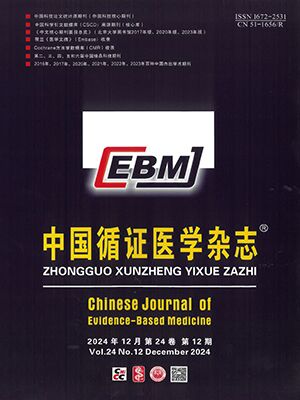| 1. |
葛德元, 赵一举. 心力衰竭的药物治疗[M]. 第2版. 北京: 科学技术文献出版社, 2000. p. 27.
|
| 2. |
刘少岩, 贡军丽. 厄贝沙坦与卡托普利治疗慢性充血性心力衰竭的疗效观察[J]. 吉林医学, 2001; 22(6): 332~333.
|
| 3. |
孙小丰, 陈丽清, 韩国红, 李勇, 林佩娣, 程梅芬. 芦沙坦对老年慢性心力衰竭的血液动力学效应[J]. 中国临床药学杂志, 2000; 9(1): 4~6.
|
| 4. |
张传焕, 沈玉芳, 陈大年, 郑慧, 沈言喜. 氯沙坦对充血性心力衰竭患者左室质量指数的影响[J]. 安徽医科大学学报, 2000; 35(2): 133~135.
|
| 5. |
王邦宁, 张传焕, 沈玉芳, 刘敏, 陈大年, 高丹屏. 氯沙坦对充血性心衰患者心功能及循环NO/ET的影响[J]. 中国临床药理学与治疗学, 2001; 6(1): 56~58.
|
| 6. |
王圣, 孙翠芳, 李新明, 刘宇飞, 丁彦春, 曲鹏. 氯沙坦与苯那普利治疗老年慢性心功能不全的研究[J]. 海南医学, 2002; 13(9): 5~7.
|
| 7. |
张传焕, 沈玉芳. 氯沙坦治疗充血性心力衰竭23例[J]. 医药导报, 1999; 18(6): 404~406.
|
| 8. |
李修昌, 谷惠敏. 氯沙坦治疗老年充血性心力衰竭疗效观察[J]. 苏州医学院学报, 2001; 21(2): 168~170.
|
| 9. |
苏伟, 张华, 李伟章, 徐亚君. 氯沙坦治疗心功能不全的临床研究[J]. 陕西医学杂志, 2001; 30(6): 336~337.
|
| 10. |
吴隐雄, 唐建华, 韦永强, 赵毅兰, 林英忠, 高鹏, 黄其昌. 培哚普利和氯沙坦对心肌梗死并心衰病人左室重构抑制作用的对比研究[J]. 广西医科大学学报, 2003; 20(3): 365~367.
|
| 11. |
方卫华, 刘志忠. 缬沙坦加苯那普利对慢性心力衰竭患者血流动力学的影响[J]. 南京部队医药, 2002; 4(1): 10~12.
|
| 12. |
李奕琏. 依贝沙坦与卡托普利治疗老年性慢性充血性心力衰竭的观察[J]. 实用医学杂志, 2003; 19(2): 201~202.
|
| 13. |
陈化, 刘秀梅, 王登科. 厄贝沙坦与培哚普利治疗老年慢性心力衰竭疗效的对比研究[J]. 中华老年多器官疾病杂志, 2002; 1(3): 197~199.
|
| 14. |
Ge DY, Zhao YJ. Drug therapy of heart failure[M]. 2nd ed. Beijing: Scientific and Technical documents Publishing House, 2000. p. 27.
|
| 15. |
Jadad AR, Moore A, Carroll D, Jenkinson C, Reynolds DJ, Gavaghan DJ, McQuay HJ. Assessing the quality of reports of randomized clinical trials: Is blinding necessary[J]? Control Clin Trials, 1996; 17(1): 1-12.
|
| 16. |
Moher D, Pham B, Jones A, Cook DJ, Jadad AR, Moher M, Tugwell P, Klassen TP. Does quality of reports of randomised trials affect estimates of intervention efficacy reported in Meta-analyses[J]. Lancet, 1998; 352(9 128): 609-613.
|
| 17. |
Willenheimer R, Helmers C, Pantev E, Rydberg E, Lofdahl P, Gordon A; Heart Failure Valsartan Exercise Capacity Evaluation Study Group. Safety and efficacy of valsartan versus enalapril in heart failure patients[J]. Int J Cardiol, 2002; 85(2-3): 261-270.
|
| 18. |
Mazayev VP, Fomina IG, Kazakov EN, Sulimov VA, Zvereva TV, Lyusov VA, Orlov VA, Olbinskaya LI, Bolshakova TD, Sullivan J, Spormann DO. Valsartan in heart failure patients previously untreated with an ACE inhibitor[J]. Int J Cardiol, 1998; 65(3): 239-246.
|
| 19. |
Pitt B, Segal R, Martinez FA, Meurers G, Cowley AJ, Thomas I, Deedwania PC, Ney DE, Snavely DB, Chang PI. Randomised trial of losartan versus captopril in patients over 65 with heart failure (Evaluation of Losartan in the Elderly Study, ELITE)[J]. Lancet, 1997; 349(9 054): 747-752.
|
| 20. |
Brooksby P, Robinson PJ, Segal R, Klinger G, Pitt B, Cowley AJ. Effects of losartan and captopril on QT dispersion in elderly patients with heart failure. ELITE study group[J]. Lancet, 1999; 354(9 176): 395-396.
|
| 21. |
Liu SY, Gong JL. The clinical observed on the chronic congestive heart failure after Irbesartan and captopril treatment[J]. Jilin Medical Journal, 2001; 22(6): 332-333.
|
| 22. |
Sun XF, Chen LQ, Han GH, Li Y, Lin PD, Cheng MF. Effect of losartan on chronic congestive heart failure in senile patients[J]. Chinese Journal of Clinical Pharmacy, 2000; 9(1): 4-6.
|
| 23. |
Zhang CH, Shen YF, Chen DN, Zheng H, Shen YX. Effect of losartan on left ventricular mass index in patients with congestive heart failure[J]. Acta Universitatis Medicinalis of Anhui, 2000; 35(2): 133-135.
|
| 24. |
Wang BN, Zhang CH, Shen YF, Liu M, Chen DN, Gao DP. Effect of losartan on cardiac function and secretion of nitric oxide and endothelin in patients with congestive failure[J]. Chin J Clin Pharmacol Ther, 2001; 6(1): 56-58.
|
| 25. |
Wang S, Sun CF, Li XM, Liu YF, Ding YC, Qu P. Effects of losartan versus enalapril on the elder patients with chronic heart failure[J]. Hainan Medicine, 2002; 13(9): 5-7.
|
| 26. |
Zhang CH, Shen YF. 23 cases of patients of congestive heart failure after losartan treatment[J]. Herald of Medicine, 1999; 18(6): 404-406.
|
| 27. |
Li XC, Gu HM. The clinical observed on the elder patients with congestive heart failure after losartan treatment[J]. Acta Academiae Medicinae Suzhou, 2001; 21(2): 168-170.
|
| 28. |
Su W, Zhang H, Li WZ, Xu YJ. Effects of losartan on the patients with chronic heart failure[J]. Shanxi Medical Journal, 2001; 30(6): 336-337.
|
| 29. |
Wu YX, Tang JH, Wei YQ, Zhao YL, Lin YZ, Gao P, Huang QC. Comparison of losartan and perindopril in inhibition of left ventricular remodeling of patients with heart failure and myocardial infarction[J]. Acta of Guangxi Medical University, 2003; 20(3): 365-367.
|
| 30. |
Fang WH, Liu ZZ. The heamodynamic effects of valsartan combined with benazepril in patients with chronic heart failure[J]. Journal of Southeast China National Defence Medcial Science, 2002; 4(1): 10-12.
|
| 31. |
Li YL. The clinical observed on the elder patients with chronic congestive heart failure after irbesartan and captopril treatment[J]. The Journal of Practical Medicine, 2003; 19(2): 201-202.
|
| 32. |
Chen H, Liu XM, Wang DK. Efficacy and safety of irbesartan and perindopril in treatment of chronic heart failure in aged patients: a comparative study[J]. Chin J Mult Organ Dis Elderly, 2002; 1(3): 197-199.
|
| 33. |
Pitt B, Poole-Wilson PA, Segal R, Martinez FA, Dickstein K, Camm AJ, Konstam MA, Riegger G, Klinger GH, Neaton J, Sharma D, Thiyagarajan B. Effect of losartan compared with captopril on mortality in patients with symptomatic heart failure: randomised trial-the Losartan Heart Failure Survival Study ELITE Ⅱ[J]. Lancet, 2000; 355(9 215): 1 582-1 587.
|
| 34. |
Pitt B, Segal R, Martinez FA, Meurers G, Cowley AJ, Thomas I, Deedwania PC, Ney DE, Snavely DB, Chang PI. Randomised trial of losartan versus captopril in patients over 65 with heart failure (Evaluation of Losartan in the Elderly Study, ELITE) [J]. Lancet, 1997; 349(9 054): 747-752.
|
| 35. |
Witte K, Thackray S, Banerjee T, Clark AL, Cleland JG. Update of ELITE-Ⅱ, BEST, CHAMP, and IMPRESS clinical trials in heart failure[J]. Eur J Heart Fail, 2000; 2(1): 107-112.
|




